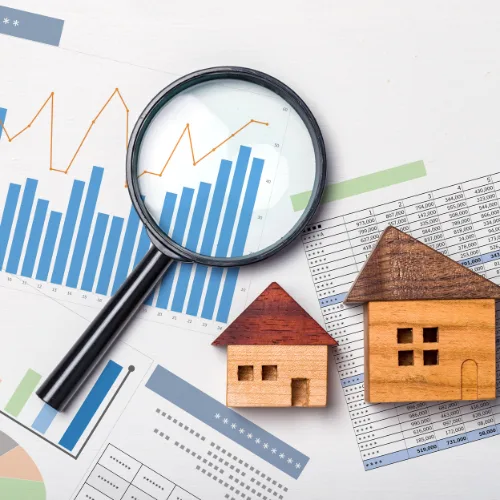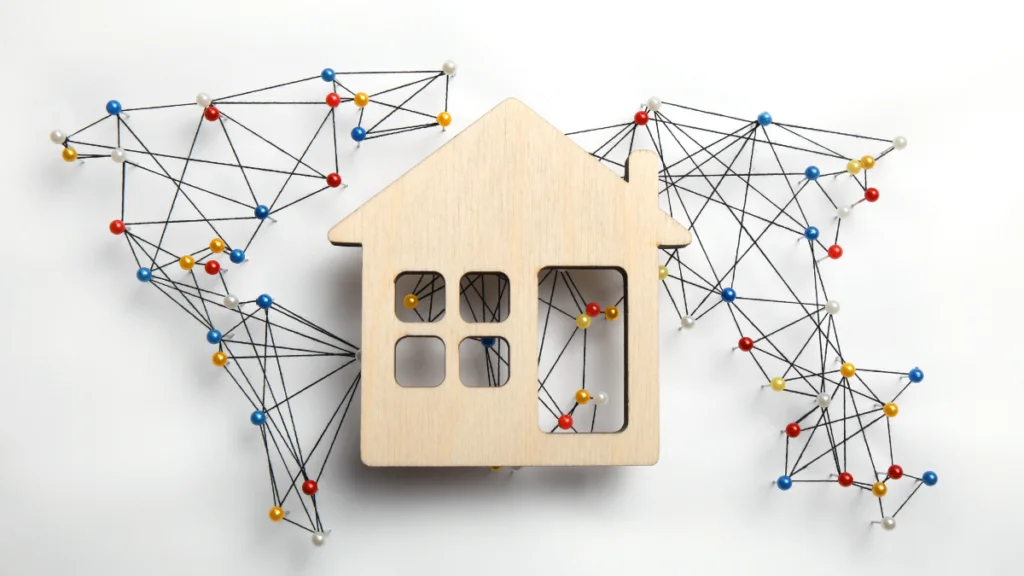Tips for Buying Investment Properties Guide: Everything Canadians Need to Know
Tips for Buying Investment Properties in Canada can open doors to steady rental income and long-term wealth. Whether you’re a first-time investor or adding to your portfolio, it helps to know the Canadian real estate basics, how mortgage rates in Canada work for rental properties, and which strategies can make your purchase smoother. This guide will walk you through everything from picking the right location to financing your purchase, so you can step into the world of investment real estate with confidence.
(Need to see if you can afford a new investment mortgage? Try our Mortgage Affordability Calculator or our Compare and Save Calculator.)

On this Page
Introduction: Why Invest in Canadian Real Estate?
Real estate investing can help you build wealth, enjoy passive rental income, and benefit from property appreciation. Canada, with its stable economy and diverse regions, often stands out as a prime market. By learning tips for buying investment properties in Canada, you can:
- Find profitable areas for rental properties.
- Negotiate competitive mortgage terms.
- Manage your cash flow effectively.
- Avoid common pitfalls that new investors face.
Value: This guide keeps it simple, showing you how to evaluate properties, plan your finances, and partner with experts so you can confidently enter (or expand in) the Canadian real estate scene.
(Still deciding if you should invest or pay down existing debts? Our Debt Consolidation Calculator might help you see if combining debts into a mortgage helps free up funds for investment!)
Section 1 – Defining Your Investment Goals
1. Clarify Your Purpose
Are you aiming for monthly rental income, or do you want to flip the property for a quick profit? Different goals shape how you approach location, property type, and financing.
- Cash Flow: Typically from rental properties.
- Capital Gains: Commonly from house-flipping or waiting for long-term appreciation.
2. Decide on Property Type
- Residential (condos, single-family homes, multi-unit homes).
- Commercial (retail, office space, etc.).
- Mixed-use (a blend of both).
For most Canadians starting out, residential rentals or a duplex can be simpler to manage.
If you’re new to budgeting for an investment property, check out our Comprehensive Mortgage Payment Calculator to see how different rates or down payments affect monthly costs.
Section 2 – Conducting Thorough Market Research
1. Location, Location, Location
Find areas with:
- Strong rental demand (like near universities or business hubs).
- Potential for property value growth (watch city development plans).
- Reasonable property prices that match your budget.
2. Local Rental Regulations
Canadian provinces and cities vary in landlord-tenant laws—like rent increase limits or eviction rules. Make sure you know the local guidelines to keep your investment profitable and stress-free.
3. Economic Indicators
Look at population growth, job opportunities, and infrastructure projects. A region with new businesses and improved transportation can see rising property values.
(Need more local data? The Canadian Mortgage and Housing Corporation CMHC website often provides regional market stats.)
Section 3 – Financial Preparation & Mortgage Strategies
1. Review Your Finances
- Credit Score: A higher score can help you snag better mortgage rates in Canada.
- Down Payment: For investment properties, lenders often ask for at least 20% to 25%.
- Cash Reserves: Keep extra funds for repairs or tenant vacancies.
2. Mortgage Options for Investment Properties
- Conventional Mortgages: Typically require bigger down payments and might have higher rates than primary-residence mortgages.
- Insured Mortgages: Less common for rentals, but possible if it’s a multi-unit property you partially occupy.
- HELOC (Home Equity Line of Credit): If you already own a home, you might use your equity to finance the down payment.
3. Working with a Mortgage Broker
A broker can scout the best deals among various lenders, especially those who cater to rental property financing. They’ll guide you on how to structure your loan for affordable mortgages that align with your rental income goals.
Section 4 – Building a Reliable Support Network
You don’t have to do it alone! Lean on experts to avoid mistakes:
1. Real Estate Agent
Find an agent who knows the investment side, not just regular home sales. They’ll clue you in on up-and-coming neighborhoods and snag deals faster.
2. Accountant / Tax Professional
They’ll help you understand the tax implications, such as claiming rental income and deducting expenses. (Remember, rental properties come with tax obligations.)
3. Property Manager
If you don’t want the day-to-day tenant calls or repairs, hire a property management company. They’ll handle everything from marketing the unit to collecting rent.
Section 5 – Analyzing Potential Investment Properties
1. Cash Flow Analysis
- Monthly Rent (minus possible vacancies)
- Monthly Expenses: Mortgage, property taxes, insurance, maintenance, condo fees (if applicable).
Make sure your expected net cash flow is positive. If you’re in a break-even scenario but anticipate property value growth, that might still be worth it.
2. ROI & Cap Rate
- ROI (Return on Investment): Compares annual net income to your total invested (down payment, closing costs, etc.).
- Cap Rate: (Net Operating Income / Property Purchase Price) x 100. A higher cap rate usually indicates a better return, but also possibly more risk.
Want a quick method to see how your investment property might handle a mortgage or interest changes? Our Compare and Save Calculator can give you a side-by-side look.
3. Future Growth Potential
Look at local city plans—are there new transit lines or commercial developments coming? If yes, property values might spike over time.
Section 6 – Tips for Managing Your Investment Property
1. Budget for Repairs
Tenants expect well-maintained units. Plan for unexpected fixes or big-ticket items (like roof replacement). A general rule of thumb is to set aside 1% of the property’s value annually for maintenance.
2. Screen Tenants Carefully
A good tenant pays rent reliably and respects your property. Always check credit, references, and employment. This helps avoid eviction hassles and property damage.
3. Consider Professional Help
Yes, property managers cost money, but they can free up your time and ensure rent is collected. They handle day-to-day tasks so you can focus on growing your portfolio or simply relaxing.
Section 7 – Closing the Deal: Final Steps
1. Secure the Right Financing
Finalize your mortgage terms. Make sure you’re comfortable with the interest rate and payment schedule. For more complex deals, a mortgage broker can help you navigate specialized investment loans.
2. Inspect & Appraise
Before you sign, always inspect the property or hire a professional inspector. An appraisal helps confirm the home’s value. If anything’s off, you can renegotiate or walk away.
3. Plan for Tenant Onboarding
If you’re buying a property with existing tenants, check the lease terms and ensure there’s a smooth transition. If vacant, be ready to market the property soon after closing to minimize vacancy.
If you need to see how your monthly mortgage might shift if you had a bigger or smaller down payment, try our Mortgage Affordability Calculator.
FAQ: Tips for Buying Investment Properties in Canada
Below are some of the most common questions about Tips for Buying Investment Properties in Canada.
How much down payment do I need for an investment property?
Most Canadian lenders ask for 20% or more down on a rental. This can vary if you plan to live in part of a duplex/triplex, so talk to your lender or broker.
Can I use my RRSP to buy an investment property?
The Home Buyers’ Plan usually applies to primary residences, not rentals. If you plan to occupy part of it, you might check specific rules. Otherwise, the HBP doesn’t typically apply to purely investment purchases.
Is rental income counted toward my mortgage qualification?
Often, yes. Lenders may factor in a percentage of expected rental income to boost your qualification. The exact percentage depends on your lender’s guidelines.
How do I handle taxes on rental income?
You must report rental income to the CRA. You can deduct certain expenses (mortgage interest, property tax, utilities, repairs). Consult a tax professional for details.
Should I choose a fixed or variable mortgage rate for my investment?
It depends on your risk tolerance and market predictions. A fixed rate offers stability; a variable rate might be lower initially but can fluctuate.
Is it better to manage the property myself or hire a manager?
Managing yourself saves money but takes time. A manager charges a fee but handles day-to-day issues (tenant screening, maintenance). Decide what suits your schedule and stress level.
Where can I find official info on being a landlord?
Check your provincial or territorial landlord-tenant board websites for regulations, or the Government of Canada’s housing pages for general advice.
Tips for Buying Investment Properties in Canada can guide you toward a profitable real estate venture. By setting clear goals, researching the market, structuring affordable mortgages, and building a strong support team, you’ll reduce risks and increase rewards. Remember:
- Plan your finances carefully (a 20% or higher down payment is usually needed).
- Explore mortgage options with a trusted broker.
- Analyze each property’s cash flow, ROI, and future potential.
- Stay updated on local rental rules and taxes.
If you’d like personalized advice or help with financing an investment mortgage, contact our team. We’ll connect you to the best resources—like our Debt Consolidation Calculator or Reverse Mortgage Calculator—and help tailor a plan to meet your real estate investment dreams in Canada. Good luck building your property portfolio!















